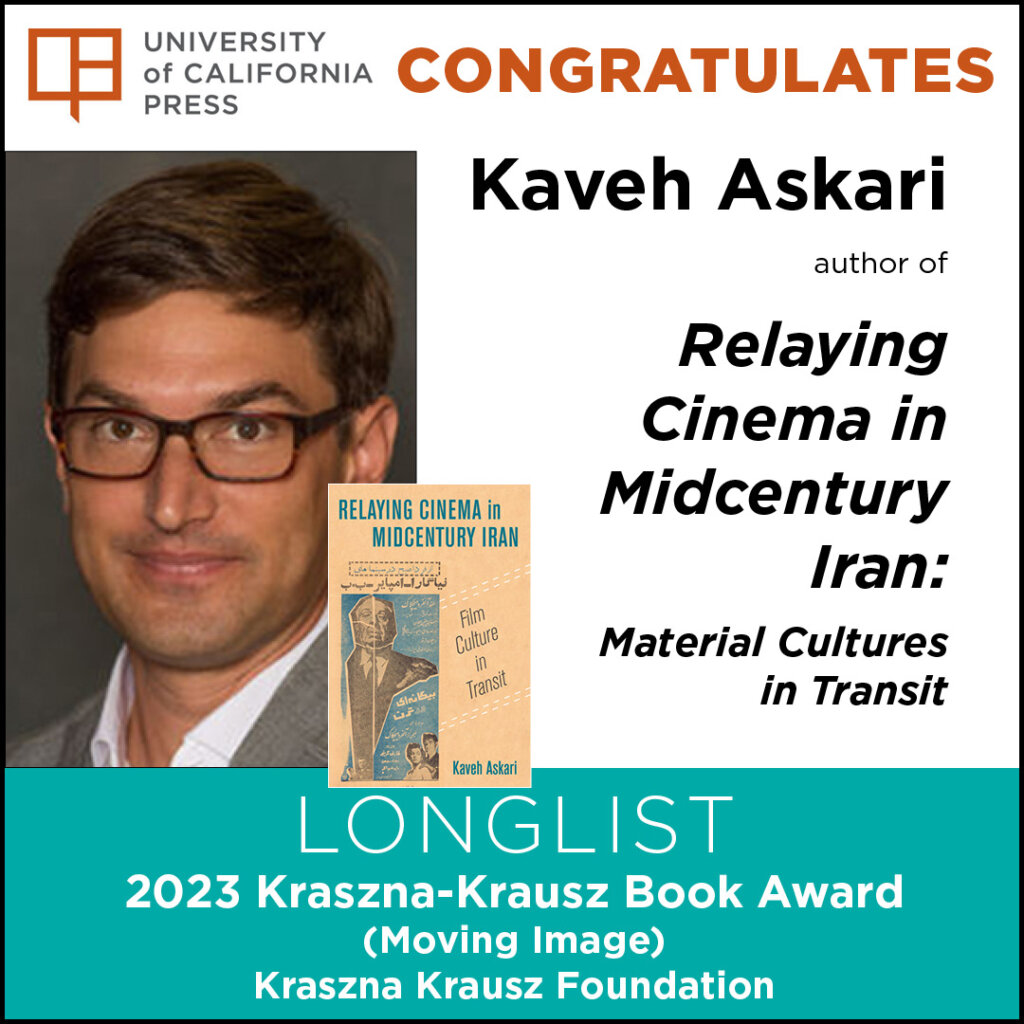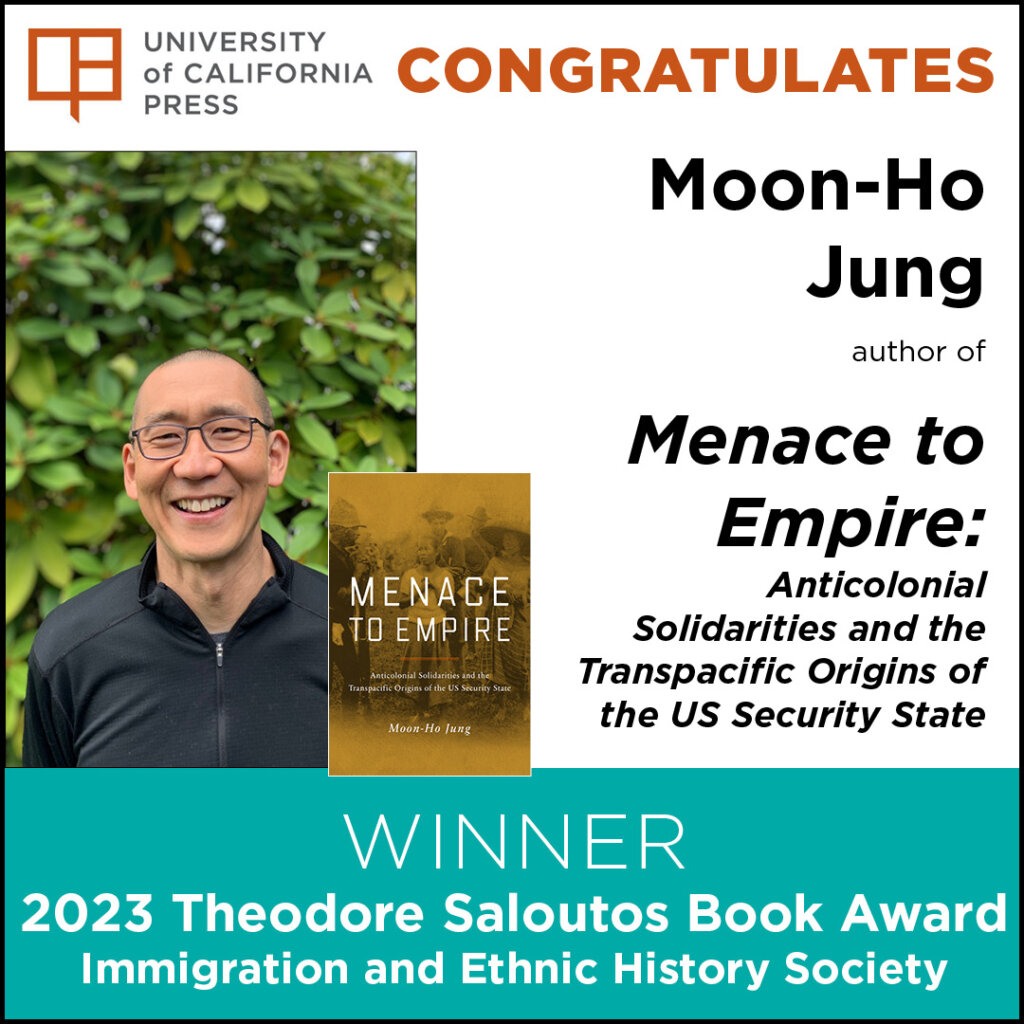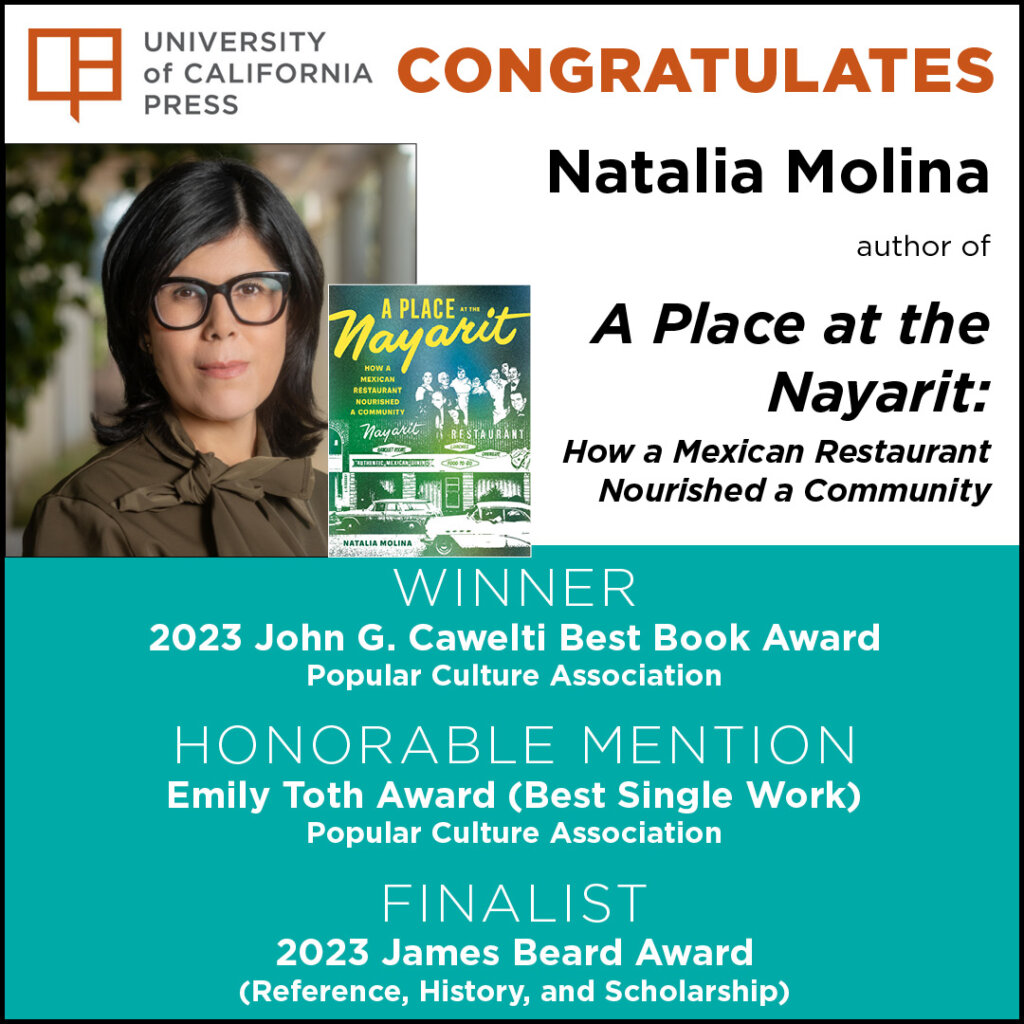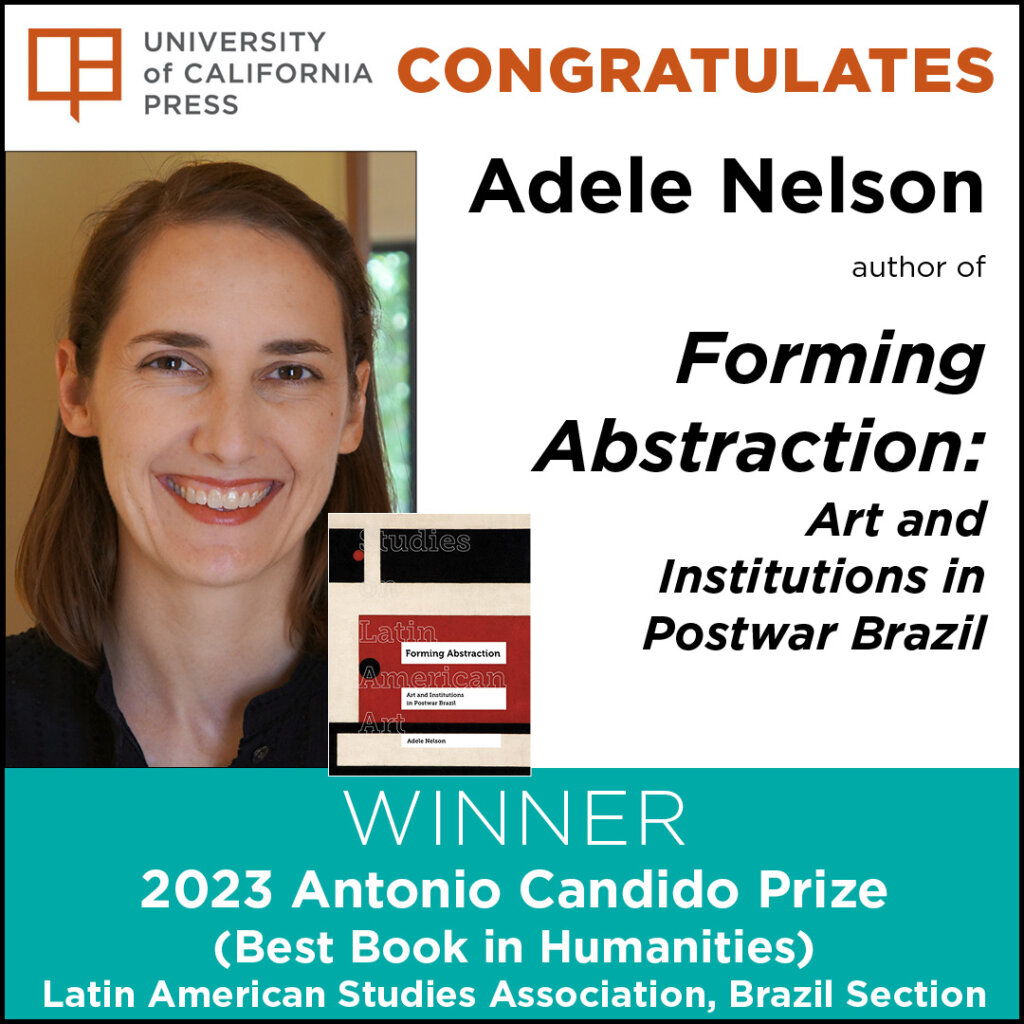UC Press is proud to publish award-winning authors and books across many disciplines. Below are several of our April 2023 award winners. Please join us in celebrating these scholars by sharing the news!

Kaveh Askari
2023 Kraszna-Krausz Book Award (Moving Image), Longlist Kraszna Krausz Foundation
Kaveh Askari is Associate Professor and Director of the Film Studies Program at Michigan State University. He is author of Making Movies into Art.
Relaying Cinema in Midcentury Iran: Material Cultures in Transit
Relaying Cinema in Midcentury Iran investigates how the cultural translation of cinema has been shaped by the physical translation of its ephemera. Kaveh Askari examines film circulation and its effect on Iranian film culture in the period before foreign studios established official distribution channels and Iran became a notable site of world cinema. This transcultural history draws on cross-archival comparison of films, distributor memos, licensing contracts, advertising schemes, and audio recordings. Askari meticulously tracks the fragile and sometimes forgotten material of film as it circulated through the Middle East into Iran and shows how this material was rerouted, reengineered, and reimagined in the process.

Patrick Bixby
2023 ASU IHR Book Award, Winner
Institute for Humanities Research, ASU
Patrick Bixby is Associate Professor of English at Arizona State University. His books include Unaccompanied Traveler: The Writings of Kathleen M. Murphy.
License to Travel: A Cultural History of the Passport
This surprising global history of an indispensable document reveals how the passport has shaped art, thought, and human experience while helping to define the modern world.In License to Travel, Patrick Bixby takes the reader on a captivating journey from pharaonic Egypt and Han-dynasty China to the passport controls and crowded refugee camps of today.

Mattias Frey
2023 Best Monograph Award, Winner
International Studies Association British Association of Film, Television, and Screen Studies.
Mattias Frey is Professor of Film, Media, and Culture at the University of Kent and the author or coeditor of seven books, including The Permanent Crisis of Film Criticism and Film Criticism in the Digital Age.
Netflix Recommends: Algorithms, Film Choice, and the History of Taste
Algorithmic recommender systems, deployed by media companies to suggest content based on users’ viewing histories, have inspired hopes for personalized, curated media but also dire warnings of filter bubbles and media homogeneity. Curiously, both proponents and detractors assume that recommender systems for choosing films and series are novel, effective, and widely used. Scrutinizing the world’s most subscribed streaming service, Netflix, this book challenges that consensus. Investigating real-life users, marketing rhetoric, technical processes, business models, and historical antecedents, Mattias Frey demonstrates that these choice aids are neither as revolutionary nor as alarming as their celebrants and critics maintain—and neither as trusted nor as widely used. Netflix Recommends brings to light the constellations of sources that real viewers use to choose films and series in the digital age and argues that although some lament AI’s hostile takeover of humanistic cultures, the thirst for filters, curators, and critics is stronger than ever.

Moon- Ho Jung
2023 Theodore Saloutos Book Award, Winner
Immigration and Ethnic History Society
Natalia Molina is Distinguished Professor of American Studies and Ethnicity at the University of Southern California and is a 2020 MacArthur Fellow. She is the author of the award-winning books How Race Is Made in America: Immigration, Citizenship, and the Historical Power of Racial Scripts and Fit to Be Citizens? Public Health and Race in Los Angeles, 1879–1939 and coeditor of Relational Formations of Race: Theory, Method, and Practice.
Menace to Empire: Anticolonial Solidarities and the Transpacific Origins of the US Security State
Menace to Empire transforms familiar themes in American history. This profoundly ambitious history of race and empire traces both the colonial violence and the anticolonial rage that the United States spread across the Pacific between the Philippine-American War and World War II. Moon-Ho Jung argues that the US national security state as we know it was born out of attempts to repress and silence anticolonial subjects, from the Philippines and Hawaiʻi to California and beyond.

Jean Ma
2023 Kraszna-Krausz Book Award, Longlist
Kraszna Krausz Foundation
Jean Ma is the author of Melancholy Drift: Marking Time in Chinese Cinema and Sounding the Modern Woman: The Songstress in Chinese Cinema. She is the Victoria and Roger Sant Professor in Art in the Department of Art and Art History at Stanford University.
At the Edges of Sleep: Moving Images and Somnolent Spectators
A fascinating and approachable deep dive into the colonial roots of the global wine industry.
Many recent works of contemporary art, performance, and film turn a spotlight on sleep, wresting it from the hidden, private spaces to which it is commonly relegated. At the Edges of Sleep considers sleep in film and moving image art as both a subject matter to explore onscreen and a state to induce in the audience. Far from negating action or meaning, sleep extends into new territories as it designates ways of existing in the world, in relation to people, places, and the past. Defined positively, sleep also expands our understanding of reception beyond the binary of concentration and distraction. These possibilities converge in the work of Thai filmmaker and artist Apichatpong Weerasethakul, who has explored the subject of sleep systematically throughout his career. In examining Apichatpong’s work, Jean Ma brings together an array of interlocutors—from Freud to Proust, George Méliès to Tsai Ming-liang, Weegee to Warhol—to rethink moving images through the lens of sleep. Ma exposes an affinity between cinema, spectatorship, and sleep that dates to the earliest years of filmmaking, and sheds light upon the shifting cultural valences of sleep in the present moment.

Natalia Molina
2023 John G. Cawelti Best Book Award, Winner
Popular Culture Association
Emily Toth Award (Best Single Work), Honorable Mention
Popular Culture Association
2023 James Beard Award, Finalist
Popular Culture Association (Reference, History, and Scholarship)
Natalia Molina is Distinguished Professor of American Studies and Ethnicity at the University of Southern California and is a 2020 MacArthur Fellow. She is the author of the award-winning books How Race Is Made in America: Immigration, Citizenship, and the Historical Power of Racial Scripts and Fit to Be Citizens? Public Health and Race in Los Angeles, 1879–1939 and coeditor of Relational Formations of Race: Theory, Method, and Practice.
A Place at the Nayarit: How a Mexican Restaurant Nourished a Community
In 1951, Doña Natalia Barraza opened the Nayarit, a Mexican restaurant in Echo Park, Los Angeles. With A Place at the Nayarit, historian Natalia Molina traces the life’s work of her grandmother, remembered by all who knew her as Doña Natalia––a generous, reserved, and extraordinarily capable woman. Doña Natalia immigrated alone from Mexico to L.A., adopted two children, and ran a successful business. She also sponsored, housed, and employed dozens of other immigrants, encouraging them to lay claim to a city long characterized by anti-Latinx racism. Together, the employees and customers of the Nayarit maintained ties to their old homes while providing one another safety and support.

Adele Nelson
2023 Antonio Candido Prize (Best Book in Humanities), Winner
Latin American Studies Association, Brazil Section
W. Andrew Marcus is Professor Emeritus, Department of Geography at the University of Oregon.
Adele Nelson is Assistant Professor of Art History and Associate Director of the Center for Latin American Visual Studies at the University of Texas at Austin.
Forming Abstraction: Art and Institutions in Postwar Brazil
The second edition of the award-winning Atlas of Yellowstone contains 50% new material, making it the authoritative reference for the world’s first national park on its 150th anniversary.
Art produced outside hegemonic centers is often seen as a form of derivation or relegated to a provisional status. Forming Abstraction turns this narrative on its head. In the first book-length study of postwar Brazilian art and culture, Adele Nelson highlights the importance of exhibitionary and pedagogical institutions in the development of abstract art in Brazil. By focusing on the formation of the São Paulo Biennial in 1951; the early activities of artists Geraldo de Barros, Lygia Clark, Waldemar Cordeiro, Hélio Oiticica, Lygia Pape, and Ivan Serpa; and the ideas of critics like Mário Pedrosa, Nelson illuminates the complex, strategic processes of citation and adaption of both local and international forms. The book ultimately demonstrates that Brazilian art institutions and abstract artistic groups—and their exhibitions of abstract art in particular—served as crucial loci for the articulation of societal identities in a newly democratic nation at the onset of the Cold War.

Joshua Zavala
2023 Flora Tristàn Award, Honorable Mention
Latin American Studies Association, Peru Section
Joshua Savala is Assistant Professor of Latin American History at Rollins College.
Beyond Patriotic Phobias: Connections, Cooperation, and Solidarity in the Peruvian-Chilean Pacific World
The War of the Pacific (1879–1883) looms large in the history of Peru and Chile. Upending the prevailing historiographical focus on the history of conflict, Beyond Patriotic Phobias explores points of connection shared between Peruvians and Chileans despite war. Through careful archival work, historian Joshua Savala highlights the overlooked cooperative relationships of workers across borders, including maritime port workers, doctors, and the police. These groups, in both countries, were intimately tied together through different forms of labor: they worked the ships and ports, studied and treated disease transmission in the face of a cholera outbreak, and conducted surveillance over port and maritime activities because of perceived threats like transnational crime and labor organizing. By following the movement of people, diseases, and ideas, Savala reconstructs the circulation that created a South American Pacific world. The resulting story is one in which communities, classes, and states formed transnationally through varied, if uneven, forms of cooperation.